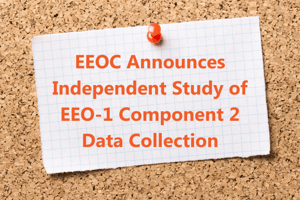 Recently, the EEOC announced a statistical study of the collected Component 2 data with the National Academies of Sciences, Engineering, and Medicine’s Committee on National Statistics (CNSTAT). The project will be an independent assessment of the quality and utility of the 2017 and 2018 EEO-1 Component 2 data.
Recently, the EEOC announced a statistical study of the collected Component 2 data with the National Academies of Sciences, Engineering, and Medicine’s Committee on National Statistics (CNSTAT). The project will be an independent assessment of the quality and utility of the 2017 and 2018 EEO-1 Component 2 data.
This data was collected for each company with 100 or more employees and it involved reporting W-2 Box 1 earnings data and hours worked by EEO-1 category, gender, race/ethnicity and pay band for each of a company’s establishments and a company consolidated report. The Component 2 data collection requirement received much attention and debate beginning in 2016 when the requirement was established, through a stay on the collection of the data in 2017, and the actual collection of the data in 2019 when a District Court Judge ordered the collection to move forward.
Opponents of the data collection have long held that the data is not useful in accurately measuring pay disparities. Proponents have pushed for increased examination by federal agencies, such as EEOC and OFCCP, into wage disparities for women and people of color.
This study arises from the requirement by the Information Quality Act that the EEOC assess and assure the quality and utility of the data collected by the agency. The examination will include an assessment about whether the data is fit for its intended use – to measure and find pay disparities. This assessment will be conducted by an expert panel of subject matter experts and is independent of the EEOC. CNSTAT is responsible for leading the study, screening panel members, holding meetings, formulating recommendations and producing a final report.
CNSTAT has already begun the analysis and the target date for completion is December 31, 2021.
This will not be the first time CNSTAT has provided a report to EEOC regarding pay data. In 2012, the agency issued a report with several recommendations on the collection of pay data for analysis including that EEOC, OFCCP, and the Civil Rights Division of the DOJ should formulate a comprehensive plan before initiating data collection of compensation. The next recommendation was to test the plan. The study also recommended that EEOC examine its capacity to summarize, analyze and protect any data collected. Regarding what data should be collected, the study recommended rates of pay not actual earnings or pay bands citing that there were many definitions of compensation. Finally, the report emphasized the need to protect the data collected.
What does this mean for companies who file EEO-1 reports? One of the results expected from the current CNSTAT assessment is that it will provide valuable information about what future pay data collections might look like. This issue is far from over, as evidenced by this quote from EEOC Chair Janet Dhillon: “Not only will this independent assessment answer critical questions about the data that was collected, but will give the Commission valuable information as we consider the future of pay data collection.” To read the full press release go to EEOC's website.
Stay connected with us as we continue to follow this important issue.
-1.png)

.png?width=593&name=MicrosoftTeams-image%20(4).png)